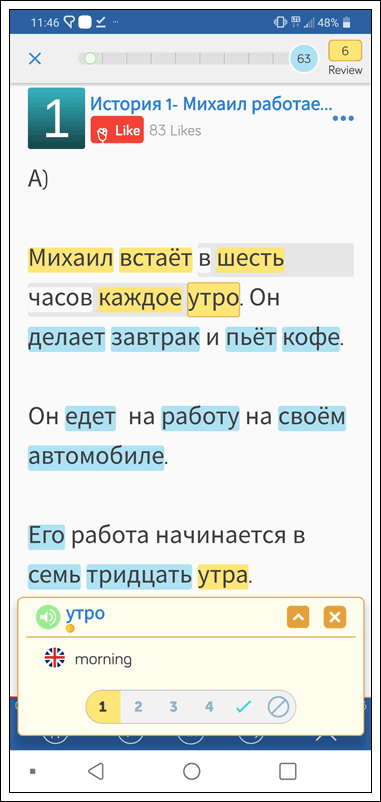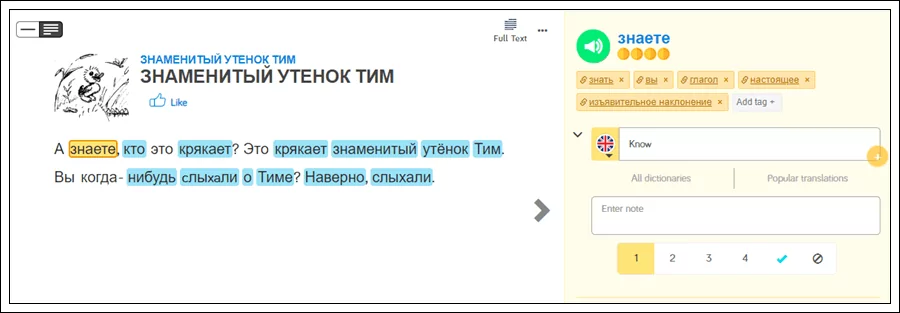The Russian Dative Case Broken Down for Beginners
The Russian dative case is used for the indirect object in a sentence. Simply put, if a noun has ‘to’ in front of it, it is most likely the indirect object.
For example:
Sergei gave a present to Alexei.
Here, Sergei is the subject, present is the direct object and to Alexei is the indirect object, and so Alexei would be in the dative case.
Ways to use the Russian dative case
After verbs such as ‘помогать / помочь’ (to help) and ‘звонить / позвонить’ (to call)
Because we don’t say things like “I help to Anna” or “I telephone to John” in English, it is quite easy to forget that we put Anna and John in the dative. Just remember, that although in English we can say things like “the student answered the teacher”, in Russian, the student answers to the teacher, and this works for many verbs that deal with interactions between people, such as recipients of actions.
Another thing that you can do is learn what case a verb takes automatically. Most dictionaries should have the various forms of кто or что following the verb, and you’ll be looking for кому, чему, which we will cover later.
With the verb ‘нравиться’ (to like)
The best way to remember how to use the нравиться construction is to remember that you are saying:
To [me, you, him, her, it, us, you, them] [I am, you are, he/she/it is, we are, you are, they are] pleasing.
| Мне | + нравится + | Nominative form |
| Тебе | ||
| Ему / ей / ему | ||
| Нам | ||
| Вам | ||
| Им |
Мне нравится шоколад – I like chocolate – [Lit.] To me chocolate is pleasing
Ему нравятся птитцы – He likes birds – [Lit.] To him birds are pleasing
What’s even better about using нравиться? The object of your desires in English is actually the subject in Russian, so you don’t need to think about declining it at all! Hurray!
With the word ‘нужен’/ ‘надо’ (to need).
| Мне | + нужен / надо + | Nominative form |
| Тебе | ||
| Ему / ей / ему | ||
| Нам | ||
| Вам | ||
| Им |
However, depending on what you are talking about, нужен will change gender:
Мне нужен сахар – I need sugar [masculine]
Мне нужно яйцо – I need an egg [neuter]
Мне нужна мука – I need flour [feminine]
Мне нужны фрукты – I need fruit [plural – note: in Russian, fruit is actually fruits and is plural]
To talk about your age
Finally, we use the dative to discuss our age! In Russian, we say “to me there are x years”.
| Мне | + number of years + | год / года / лет |
| Тебе | ||
| Ему / ей / ему | ||
| Нам | ||
| Вам | ||
| Им |
Мне 18 лет – I am 18
Тебе 26 лет – You are 26
Ему 4 года – He is 4
| Remember that numbers ending in 1 take год, numbers ending in 2, 3, 4 take года and anything else takes лет! |
Expressing emotion
When expressing emotion, we take the personal pronoun in the dative (see above in ‘to talk about your age’) and add the short form of the adjective in neuter:
Мне скучно! – I’m bored!
After the following prepositions
| Preposition | Translation | Usage |
| К | [to; towards] | destination of movement |
| По | [down, along, through, by, over, on, among, around] | place of movement |
| По | [by, on] | means of communication |
| По | [on, of, for, in] | attribute, specialisation |
| По | [on, in, every, each] | time of regular action |
| По | [because of, by] | reason or cause |
| Благодаря | [thanks to] | reason or cause |
| Согласно | [according to, under] | accordance |
How to form it
The dative, for some reason, is often forgotten and many people find verbs and adjectives difficult to decline. Using this guide, you will be able to decline perfectly!
Firstly, learn the following by heart:
| Nominative | Dative |
| Я | Мне |
| Ты | Тебе |
| он / она / оно | Ему / ей / ему |
| Мы | Нам |
| Вы | Вам |
| Они | Им |
| Nominative | Dative Masculine | Dative Feminine | Dative Neuter | Dative Plural |
| тот | тому | той | тому | тем |
| этот | этому | этой | этому | этим |
| Nominative | Dative | |||
| что | чему | |||
| кто | кому |
Now, let’s look at how to turn nominative nouns and adjectives into dative nouns and adjectives:
The Russian dative nouns and adjectives
Masculine Nouns
When a noun ends in a consonant, we add у
When a noun ends in й or ь, we replace this with ю
Masculine Adjectives
Regular adjectives take ому
Soft adjectives take ему
Example: Таня звонила симпатичному русскому человеку (Tanya called the nice, Russian man)
Feminine Nouns
When a noun ends in а or я, we replace this with е
When a noun ends in ь, we replace this with и
When a noun ends in ия, we replace this with ии
Feminine Adjectives
Regular adjectives take ой
Soft adjectives take ей
Example: Сергей подарил цветы красивой девушке (Sergei gave the flowers to the beautiful girl)
Neuter Nouns
When a noun ends in о, we replace this with у
When a noun ends in е, we replace this with ю
Neuter Adjectives
Regular adjectives take ому
Soft adjectives take ему
Example: Вероника идёт к старому музею (Veronika is walking towards the old museum)
Plural Nouns
Look at the last letter of the nominative singular form:
If the last word ends in a consonant, add ам
When a noun ends in о or а, we replace this with ам
When a noun ends in е, я or й we replace this with ям
Plural adjectives
Regular adjectives take ым
Soft adjectives take им
Example: Дождь барабанил по широким окнам (The rain beat down on the wide windows)
As you can see, the dative case deals mainly with indirect objects, and after select prepositions and verbs!
The easiest thing to do with the dative case is to remember that it is generally preceded by the idea of to. You telephone to somebody, you help to somebody, and these are things that are best learned on a case-by-case basis.
Improve your Russian thanks to 1000s of hours of content
If you’re looking for a faster way to improve your Russian, one of the best things to do is to read and listen… A lot!
Rather than going through different websites, looking up dictionaries, and shuffling through textbooks, you can store all your content into one place and easily study Russian using LingQ.
LingQ’s library has thousands of hours of Russian content for you to choose from. For example, if you’re a beginner, you can go through LingQ’s mini-stories which include text-to-speech, audio, and a variety of dictionaries that are easily accessible as you read.

Not only does LingQ come pre-packed with great content, but you have the ability to also import your own content too. For example, Russian audiobooks, videos from YouTube, and so much more. Start learning Russian with LingQ today!

For more information about importing content into LingQ, please check out this guide.


